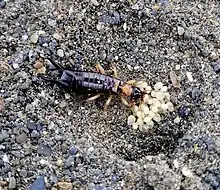| Seashore earwig | |
|---|---|
 | |
| Anisolabis littorea with eggs | |
| Scientific classification | |
| Domain: | Eukaryota |
| Kingdom: | Animalia |
| Phylum: | Arthropoda |
| Class: | Insecta |
| Order: | Dermaptera |
| Family: | Anisolabididae |
| Genus: | Anisolabis |
| Species: | A. littorea |
| Binomial name | |
| Anisolabis littorea (White, 1846)[1] | |

The seashore earwig (Anisolabis littorea) (Māori: mata)[2] is a species of earwig in the family Anisolabididae.[3] The species was first described in 1846 by Adam White.[4] This species has a blackish-brown body with brown-yellow legs. It has two light brown spots on its head, close to the inside of each eye. Its abdomen is widest at the seventh segment. It is flightless.[5] It is native to eastern Australia and New Zealand. Similar both ecologically and taxonomically to the maritime earwig, this species is commonly found on beaches under stones and debris. It is a carnivore, feeding on millipedes, flies, and isopods such as woodlice. Like most other earwigs, the females care for their young during development, and the larva go through five instars before becoming adults. The species also has a negative phototaxis, meaning that it tends to move away from a light source.[1]
See also
References
- 1 2 "Australian Faunal Directory". Environment.gov.au. 2008-10-09. Retrieved 2009-09-07.
- ↑ Parkinson B. J. & Horne D (2007). A photographic guide to insects of New Zealand. New Holland. p. 30. ISBN 978-1-86966-151-9.
- ↑ "2. Anisolabis littorea (White)". Ento.csiro.au. 2004-09-19. Retrieved 2009-09-07.
- ↑ White, A. 1846. Zoology of Voyage of H.M.S. Erebus H.M.S. Terror and under the command of Captain Sir James C. Ross, during the years 1839 to 1843. London : E.W. Janson Vol. 2 27 pp. pl. 6 [24].
- ↑ Giles, E.T. (1952). "The Biology of Anisolabis littorea (White) (Dermaptera: Labiduridae)". Transactions and Proceedings of the Royal Society of New Zealand. 80: 383. Retrieved 27 September 2021.
External links
- Anisolabis littorea discussed on RNZ Critter of the Week, 26 May 2023